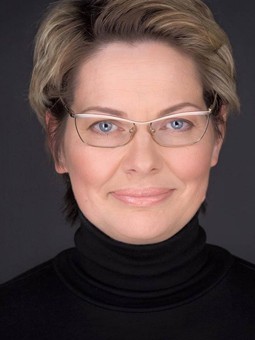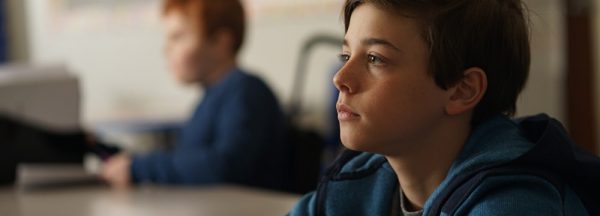 “You live with your seriously ill mother in a village. You are offered a job in a big city. What decision will you make?” a teacher asked students during a Social Science lesson. Ivan said that he would take the job in order to pay for his mother’s treatment and hire a nurse. And then he wept bitterly. Psychologist Ekaterina Sivanova spoke about an important conversation with her son.
“You live with your seriously ill mother in a village. You are offered a job in a big city. What decision will you make?” a teacher asked students during a Social Science lesson. Ivan said that he would take the job in order to pay for his mother’s treatment and hire a nurse. And then he wept bitterly. Psychologist Ekaterina Sivanova spoke about an important conversation with her son.
I was listening to my son and felt choked up

Ekaterina Sivanova
I have a son. Ivan is in 6th grade. He is 12 years old. Psychologists call this age the beginning of adolescence (now, however, the age range is shifting to 10 years). From the moment of his conception, we talk a lot with Ivan, although I feel that he has become more careful in choosing topics for discussion with me.
Every day I pick up my son after school and take him to his training sessions. The drive takes about 40 minutes. And if he is not sleeping or listening to an audiobook, we talk. Naturally, we talk first of all about his lessons and about what happened at school.
Just the other day, Ivan told me about a task that he was doing during a social science test.
“You are a young IT specialist, you live in a village with your mother, who is seriously ill, and you have to take care of her. You are offered a job in a big city with a salary several times more than you earn and with good career prospects. What decision will you make?”
My son told me about his answer: “I will agree to the offer and go to work in the big city. The change in my salary will allow me to hire a nurse for my mother, pay for expensive medications, and give me an opportunity to visit her often.”
He told me this and looked at me, sort of asking: “What do you think? Am I right?”
And I had a lump in my throat. But he was right! And I told him that yes, he was right and solved the task correctly.
We drove on, pushing through Moscow traffic jams, and suddenly I heard my sixth grader sobbing.
“Ivan, what’s wrong?”
“Mom, how could I leave you, and so sick too?” He burst into tears.
I managed to calm him down, telling him that I was taking care of my health, that I was not going to get sick, and if this happens, then I have a husband and the knowledge that children are not obligated to always be near their parents, that the best medicine for any mothers is to know that her child lives his own separate life from her.
“How could I leave my mom?”
This conversation with my son gave me food for my thought for more than one day.
After all, at the age of 12, I would have definitely chosen to stay with my mother. And the particle “would” is completely inappropriate here, because up to my 40 years of age I chose to “stay with my mother.” When I was 44, my mother was passed away…
At the age of 30, I was making a decision about moving with two small children to my husband’s place in another city. And the reason not to move was: “How can I leave my mother?” But when I did go, I couldn’t really tell my mother about my decision (we went on a vacation, and then decided to stay, I said). Several years later, we helped my mother move to the city where we lived.
If we look at my story as a task from a textbook on psychology and try to “make a diagnosis”, then we will talk about the infantilism of a 30-year-old woman and the absence of separation from her mother. But if we look at this story, knowing all the details of my life then, it will become quite obvious that I simply could not behave differently. And I didn’t even think about “leaving my mother.”
What is the difference between my son and me, except for the 35 years age difference? How do I explain his “correct solution to the problem”? How did my husband and I manage to raise a person who can and knows how to choose himself?
Live without struggle
I turned 12 in 1985. In the summer of that year, the Festival of Youth and Students was held in Moscow. Its symbol was “Katyusha”. I remember well that summer and myself. I was a tall girl with a long braid. I was active, loud, lively, I read a lot. I loved my parents to the point of ringing in my ears and dreamed of my own dog.
Everything in my life was very clear and predictable. Mom was a teacher, dad was an officer, according to the plan I was supposed to become either a teacher or a pediatrician. We lived in Czechoslovakia. I was an excellent pupil and the head of the school’s squad board, for my active work I was even awarded a trip to Artek.
Even in my thoughts, I would not even imagine my life without my mom and dad, and when we had to separate – my parents often sent me to my grandparents’ – I suffered physically. My love, my need to be with my parents, mainly with my mother, was unhealthy (I now understand this) and it quite often irritated my parents. I was too emotional, came too close, and demanded too much attention.
All the books and films that I then read and watched were imbued with love for my parents. Do you remember the cartoon about the baby mammoth that was looking for his mom? And the book “The Elder Sister” by Lyubov Voronkova? These are good and kind stories. But it was so hard to even think to live without my mother after these stories…
My parents are post-war children, both were born in 1948. The task of children of that time was one: to survive. They survived, gave birth to children and began to educate them in the system “one must be able to be grateful for the fact that there is no war.” There is no need to say how the generation of my grandparents grew and survived in the times of the revolution, civil war, famine, collectivization, repression, and the Great Patriotic War.
The 90s fell on the youth of my generation with the destruction of values and the formation of an incomprehensible new ideals.
But it was we who began to give birth to our children who just needed to live without struggle. Their task is simply to be human and to make this world a better place.
They don’t need to survive, they don’t need to overcome anything. Indeed, the whole world is at their feet.
And it is in this place that the question arises of how to educate new people, how to convey our values to them, making it possible to choose from these values what is acceptable in each specific case.
I think that the answer here is simple, it is the same as the answer to the question: “Why did I give birth to a child?” I gave birth to each of my three children in order to give them life. That is all.
When the answer sounds like this, there can be no expectation that my child will lay down his life at my feet. This means that he will choose himself, respecting and honoring his father and mother.

















